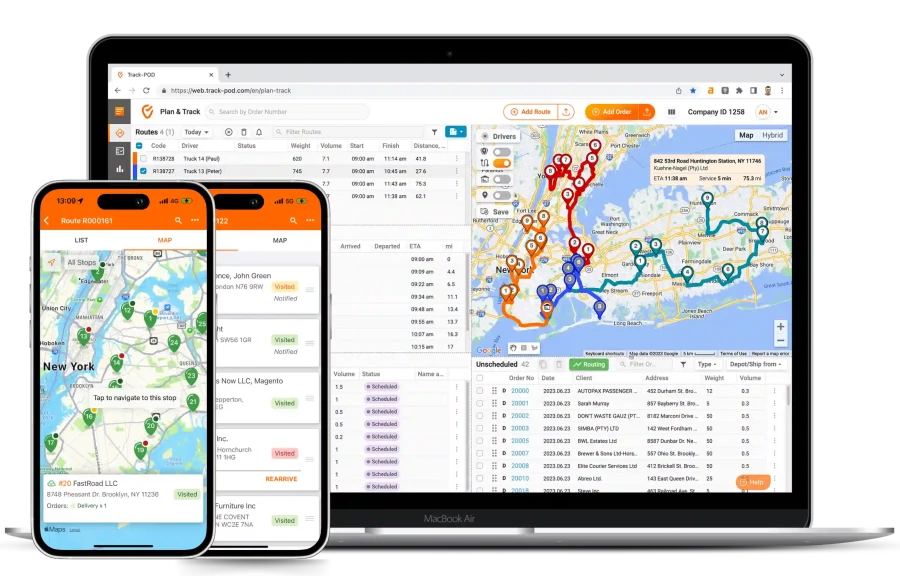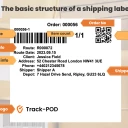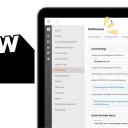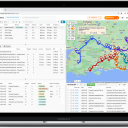Transportation Dispatching Mastery for Fleet Rock Stars
Updated on
March 26, 2024
by
Mike Foster

If transportation is your game and you want to excel in the area of fleet management and logistics, then read on as we provide some tips on how to become a dispatch management rock star!
A good dispatcher is a person who ensures that drivers have comprehensive information about the route they are to follow, complete with any additional information regarding potential traffic issues, road maintenance, weather issues, and a schedule that includes expected delivery times and customer details.
This may sound like a lot of information, particularly if you have a large team of drivers who are waiting for their instructions for the day, but with technology today, all of this information has become readily available with just a few clicks of a mouse.
And then there are the other challenges that you have to deal with. Changing the schedule at the last minute to accommodate an emergency delivery, taking calls from demanding customers, and sending a recovery team out when vehicles break down.
On a bad day, you may even run out of recovery teams when vehicles break down simultaneously and you need to reschedule all the other routes as you wait for critical spares to arrive.
Good dispatchers know where their vehicles are at any given time of the day. This is, again, possible with the aid of technology. You need to be in touch with drivers, wherever they are, giving them instructions and traffic updates, and being available should they need assistance.
Fleet managers need to be good communicators, have critical thinking skills, keep calm in emergency situations, be extremely organized, and be good at multitasking.
The information provided each morning before drivers set off and the support that they get from you during the day is essential to the success of the business. Sending vehicles out on the road is costly in terms of drivers’ wages, fuel, and vehicle maintenance.
When vehicles are delayed, it costs even more. Careful planning of your vehicle routes means optimizing delivery times and fuel, and it improves customer relationships as they learn that they can rely on your timely deliveries.
Understanding the role of a dispatcher
Transportation dispatch personnel coordinate any activities in the business that require transport. They see to it that deliveries go out on time and that customers are notified about the expected time of arrival. If there is a delay for some reason, the dispatcher will let the customer know.

Fleet managers, on the other hand, are in charge of the commercial vehicles in the business. They manage the maintenance of the company’s vehicles and the procurement of new ones.
They are also responsible for hiring suitable drivers, seeing to it that they have the proper training, and monitoring their performance. As such, fleet managers are involved in the human resources side of the business concerning their drivers.
Together, fleet and dispatch managers make sure that the vehicles are in good running order, that the delivery or collection routes are properly planned, that vehicles are tracked while out on the road, and that drivers perform according to company standards.
The optimization of delivery routes means that customers get their deliveries on time, which will bring in repeat business. Route efficiency will also save running costs and increase the life span of vehicles in the long run.
Essential skills for a dispatcher
If you’ve been driving trucks for a couple of years now and are looking to make a career move, becoming a transportation dispatcher is a step in the right direction for someone with your experience. We provide some useful tips for becoming a dispatcher for truck drivers.
Dispatchers manage and coordinate the transport side of businesses and perform the following duties:
- They produce or oversee efficient delivery schedules for drivers to follow.
- Ensure clear communications between dispatch personnel, drivers, and customers.
- Keep track of all their vehicles on the road and alert them to potential traffic or weather problems.
- Handle emergencies and use critical thinking skills to solve problems.
- Reschedule route plans in cases of emergency deliveries.
- Monitor driver safety and performance.
- Monitor vehicle efficiency and cargo safety.
There is no formal qualification required for the position of transportation dispatcher, but many companies that employ truck dispatchers have their requirements, which may include the following:
- A minimum of a high school diploma.
- Excellent communication skills.
- Computer literacy.
- Knowledge of the laws and regulations for trucking companies would be helpful.
Transportation dispatchers must be good with people as they communicate with drivers and customers, giving clear, easy-to-understand instructions and maintaining good customer relationships. They need to be organized and efficient, able to remain calm in emergencies, and great at multitasking.
When looking for a job, some companies require an associate degree in transportation and logistics, and it would undoubtedly improve your chances of getting ahead in your trucking career.
Most companies require some experience in driving, shipping, or logistics; however, some companies will only accept an associate degree with this experience.
Leveraging technology for efficient dispatching
Today's trucking environment is highly competitive, with Truckinfo.net reporting 1.86 million companies driving trucks in the US alone as of June 2023. For your company to be competitive, you must be a step ahead regarding service and efficiency.
Nowadays, if you don’t use technology to your advantage, your company will lag behind. Technology helps you optimize your operations to churn out more deliveries, keep track of vehicle maintenance requirements, watch over the safety of your drivers and cargo, and keep your customers happy. Without it, you will lose touch somewhere in this complex set of competencies.
There is a wide range of dispatch software that is free to use on various sites on the internet. All you need to do is register, and it will help you plan your delivery routes.

There are generally a few disadvantages with the free dispatch software, such as a limited number of delivery points and the lack of sophisticated technology means that when there is an interruption in network availability, you lose the continuity of data for tracking purposes.
The software providers may also limit the number of users who have access to the system, and customers can’t track their orders. The free dispatching options use GPS technology, but unless you upgrade to one of their paid versions, the free dispatch system is limited in its flexibility.
The paid versions of software, by comparison, offer more versatility and improved efficiency of operations. You can change delivery schedules to accommodate those last-minute urgent deliveries and re-route your vehicles if necessary.
The more sophisticated options include a whole lot more functionality, such as:
- Vehicle tracking facilities on large dashboard displays.
- Improved communication methods such as automated emails and mobile phone apps.
- Comprehensive reporting tools.
- Delivery tracking facilities for customers.
- No-contact delivery technology.
- Paperless proof of delivery options.
- Interfacing with your CRM or ERP systems.
- Storage of tracking data for later retrieval.
To this end, we suggest you look at Track-POD’s last mile logistics software, a complete and easy-to-use route planning and vehicle tracking solution that will enhance delivery processes, increase profit margins, and improve customer relations. Even if you are looking for a free solution, Track-POD offers a free 7-day trial to explore the platform’s fit for your needs.
Navigating licensing and certification
Not all states or countries require truck dispatchers to have a dispatcher license; however, you will need to check with the regulatory authorities in your area.
According to the requirements of the Federal Motor Carrier Safety Administration (FMCSA), motor carriers, brokers, and freight forwarders need a freight broker license to operate. Here is a breakdown:
Motor carriers use commercial vehicles to transport property, hazardous materials, or passengers for business gains.
Brokers are the “middle person” between shippers and motor carriers. They don’t ship the goods themselves but arrange their transportation.
Freight forwarders arrange the shipments and are responsible for transporting the goods.
The Application for Motor Property Carrier and Broker Authority form gives detailed instructions that contain helpful information if you are considering applying for a job in this sector and need a dispatch license.
Strategies for effective fleet management
Managing a fleet of commercial vehicles brings a mixed bag of responsibilities, and having a few sound strategies is essential to survive in this dynamic and challenging environment.
1. Vehicle maintenance is at the top of the list. Your vehicles should receive regular maintenance checks to avoid breakdowns and keep them running efficiently. Breakdowns cause bottlenecks in your distribution schedule and additional expenditures that could be avoided. Have a schedule drawn up for regular maintenance checks on each vehicle in your fleet to replace worn parts before the break.
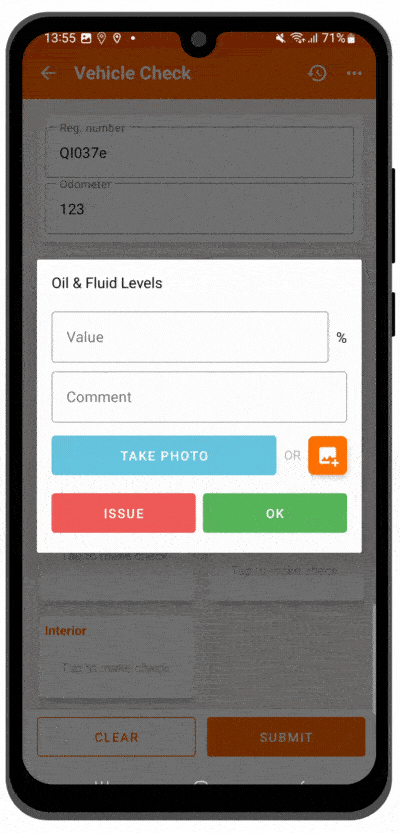
Vehicles that are in good condition will also use less fuel. The more sophisticated vehicle trackers have sensors in various parts of the trucks that will alert you when parts need replacing or when vehicle maintenance is due.
2. Plan your delivery routes to maximize efficiency and save time and fuel. Using GPS waypoints will help you plot your truck stops on a map and determine the best route. Consider inefficient routes, such as steep mountain passes, and allocate longer but more fuel- and time-efficient alternatives if necessary.
3. Track your vehicles and monitor fuel expenses. If vehicles are using too much fuel, there is a reason for it: bad driving or an overdue maintenance check. Ensure drivers stick to the planned delivery schedule and only go off route with reporting back to base. You can also use GPS technology to check roadworks and traffic problems along the route. If necessary, you can communicate with your drivers and re-route vehicles in this case, alerting customers to possible delays in delivery times.
4. Ensure efficient communications between dispatchers, drivers, and customers. Customer communication is key to maintaining good business relationships and securing repeat business. Giving your customers access to track their deliveries is first prize, and advising them of any unexpected delays will gain their trust. Customers are busy people, too, and we would appreciate your consideration.
5. Vehicle tracking also highlights safety issues by identifying irregular driving habits, such as sudden stops or speeding. One of the most significant risks in the trucking industry is driver fatigue. Opt for a vehicle tracking system to determine whether your drivers stop regularly for breaks.
On that point, maintaining compliance with the regulations that apply to your area is not only important if you don’t want to pay heavy fines, but they are also there to help you.
Most states in the US, as well as many European countries, have enforced the use of electronic logging devices (ELDs) that monitor drivers’ shift times as well as their stops during the day.
Generally, long-haul drivers should not be driving for more than 14 hours during any shift and should take regular breaks during their shift. Drivers must also take a break between shifts of at least 8 hours. This may differ between areas of jurisdiction, so check your state or country’s laws.
When investigating dispatch system options that will take care of some or all of the above points, consider Track-POD’s comprehensive route planning and vehicle tracking system, which enables you to review your delivery schedules and make decisions about urgent deliveries that crop up to disrupt your carefully planned schedules.
Go paperless with the electronic proof of delivery (ePOD) app and consider no-contact deliveries as part of your excellent customer service.
Use the Track-POD dashboard to track your vehicles and drivers in real-time as they navigate the routes you have planned, efficiently and timeously delivering their cargo.
Other rock stars before you
In a dynamic environment that promises delivery within two hours of receiving an order, truck and trailer expert company Skuba needed planned routes that could guarantee accurate ETAs, distribute the flow of shipments equally among their many drivers, and communicate the delivery status with their customers.
Track-POD did not disappoint. With their easy-to-learn functionality, Skuba’s management team can now view their orders on a map distributed amongst drivers on the various routes. Customers are kept in the loop, and the number of orders has since doubled, while the Track-POD delivery system is currently being implemented in branches across 18 international countries.
In another success story, Imperial Dade Canada has reduced the number of customer calls by one hour per day per driver, equaling a saving of 100+ hours on any day. They have also managed to save 10 hours per day by introducing Track-POD’s ePOD, a paperless proof of delivery scanned and transmitted in minutes. The visibility of last mile deliveries has allowed customers to track their orders in real-time, and dispatch managers have peace of mind as they can focus on managing vehicles and drivers.
Final word
To become a successful transportation dispatcher or fleet manager, you must be highly organized, have critical thinking and analytical skills, and be a good communicator. Logistics is a dynamic environment to work in, and you need to be motivated and a great multi-tasker dedicated to providing excellent service at all times.
Your experience in logistics, driving, or shipping will serve you well in your quest to manage a fleet of vehicles or a team of drivers. Learn as much as you can about technology and leverage the tools to assist you in your quest for perfectly optimized operations.
Become the rock star that drivers and customers can turn to when they need assistance, and ensure you and your team provide the best support possible. The success of the business depends on effective logistics and excellent customer support. There will always be challenges, but that is the reason you have chosen a career in this domain—continuous learning about people and systems and striving for perfection along the delivery routes.
